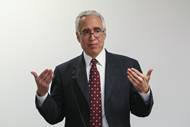Recent Defense Department e-mails disclosed by Government Executive suggest that the federal government’s largest bureaucracy is about to ask Congress for the same hiring and firing freedoms that the Homeland Security Department won when the department was created in October. The details of Defense’s transformation proposal, as it is called, are still under wraps, but the intention is clear. “If you want to rewrite the book,” a senior Defense official wrote in one of the e-mails, “here is your chance.”
Labor unions pounced on the e-mails as proof that the Bush administration is out to dismantle the civil service. “There is absolutely no justification for them to be thinking that way other than that they’re very anti-union and anti-civilian employee,” said Bobby Harnage, national president of the American Federation of Government Employees. “If they want to have the same fight over on the Hill that we had on homeland security, they can depend on it because it’s going to be there. If they are drawing a line in the sand, I’m accepting the challenge.”
Harnage is right that the department wants out of the current system, but wrong about the anti-union, anti-civilian bias. The person leading the Defense transformation effort, Undersecretary for Personnel and Readiness David Chu, is a deeply committed public servant in his own right, and a former head of research at RAND, the nation’s leading public management think tank.
Ironically, practically any change is likely to result in more job satisfaction among union and non-union members alike, particularly if Defense succeeds in thinning its needless layers of middle management. The front-line workers represented by unions are just as angry about the lack of resources, understaffing and poor performers as are senior officials. They want the tools to get the job done in the post-Sept. 11 world and deserve a personnel system that fills jobs quickly, disciplines poor performers effectively, bases promotions on merit and performance rather than connections and favoritism, and rewards workers for a job well done rather than just another year on the job.
Defense is not the only agency that wants out of today’s ossified personnel system. The National Space and Aeronautics Administration wants out, too. The Office of Personnel Management is also on its way to creating an exemplary system for itself.
If Homeland Security, Defense, NASA, and OPM have their way, this coming year will mark the beginning of the end of the civil service system as we know it. The federal government’s mission is too important to hobble with a civil service system that encourages more game-playing than a casino. That is certainly the view of the the National Commission on the Public Service, which is led by former Federal Reserve Chairman Paul Volcker and sponsored by the Brookings Institution’s Center for Public Service, which I direct. The commission’s indictment of the current civil service system could not have been tougher:
- The federal government is not working nearly as well as it can or should. Its failure to reward the best performers or demand change among the worst has weakened morale.
- Too many of our most competent civil servants and judges are retiring or leaving early. Too few of our most talented citizens are seeking careers in government or accepting political or judicial appointments.
- A clear sense of policy direction and optimal performance is too often lacking, undercutting efficiency and public confidence.
- There is danger of healthy public skepticism giving way to corrosive cynicism.
The commission was equally blunt in recommending its solutions:
- Fundamental reorganization of the federal hierarchy to refocus attention on missions, not constituencies, and restoration of the president’s authority to make it happen.
- An overdue streamlining of the presidential appointments process and a cut in the number of political jobs.
- Immediate action to end the pay compression that is crippling the recruitment of talented citizens for top government jobs.
The commission’s report is certain to irritate just about everyone in the system, from labor unions to political appointees, congressional committees and budget cutters. But the commission cares only about one constituency: talented Americans who want to serve their nation. Some are still in high school or college, but wouldn’t know how to get a federal job even if they wanted one. Others are in mid-career, but cannot apply for openings that are never advertised. Still others are at law schools, nonprofits or think tanks, but cannot afford to take the kind of pay cut required for a presidential appointment or judgeship.
The commission believes it should not take an increase in unemployment or a terrorist attack to generate interest in federal jobs. Nor should it take a wealthy parent or spouse to fill in the salary gaps. The commission wants government to welcome talented Americans at all levels. And it wants those employees to have clear missions, strong leadership, and enough resources and training to succeed. Surely, that is a goal that federal unions and the Bush administration can both embrace.
The Brookings Institution is committed to quality, independence, and impact.
We are supported by a diverse array of funders. In line with our values and policies, each Brookings publication represents the sole views of its author(s).







Commentary
Op-edUnleashing Reform
February 15, 2003